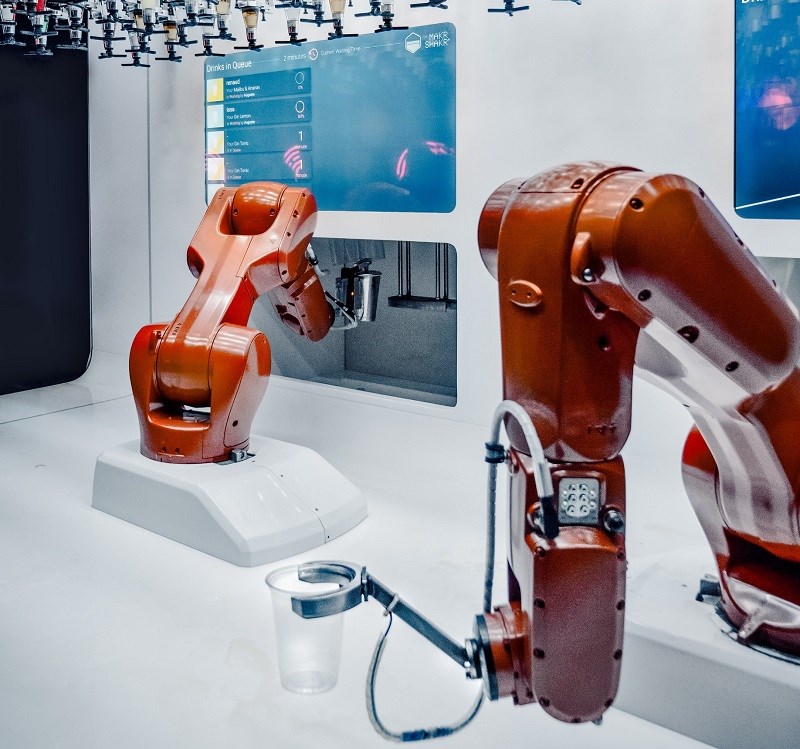
Editor's note: Read the latest on how the coronavirus is rattling the markets and what you can do to navigate it.
The widespread disruption caused by the coronavirus pandemic is going to force the restructuring of many business models, and the impact will be more pronounced in industries that are overly reliant on a human workforce. It’s widely expected that the fallout of the pandemic will accelerate automation across industries forced to lower reliance on humans, the weakest link in most commercial ventures.
Unlike humans, robots are low maintenance, immune from diseases, and are more consistent in their performance. Automation adoption has been on the rise in recent years, but the pandemic, and social distancing requirement that may be long lasting, are going to prompt industries to take to robots like never before. Thus, 2020 may prove to be a pivotal point when technological innovation takes off, making more sophisticated AI-powered machines that can replace increasingly complicated human jobs in the next wave of automation. According to a pre-pandemic forecast the global industrial automation market is expected to grow 7.2% annually to reach US$ 288 billion by 2026.
As more businesses globally look to robots to boost operational performance, reliability of production and lower costs, the automation solutions providers stand to reap a rich windfall of profits. The following companies are at the forefront of automation, serving a wide variety of industries where disruptive technologies are pushing to replace human work as businesses brace for a multiyear rebuilding and recovery work.
| Honeywell International Inc | |
| Ticker: | HON |
| Forward Div Yield: | 2.65% |
| Forward P/E: | 19.38 |
| Price: | US $134.03 |
| Fair value: | US $162 |
| Value: | 16% discount |
| Moat: | Wide |
| Moat trend: | Stable |
| Star rating: | **** |
| Data as of May 19, 2020 | |
A sprawling conglomerate, Honeywell (HON) operates globally in four business segments--aerospace, building technologies, performance materials and technologies, and safety and productivity solutions. It serves diverse markets including the U.S. defence, e-commerce, and oil and gas industries.
“Honeywell is successfully transitioning toward becoming a software-industrial company,” says a Morningstar equity report, noting it “remains one of the best-positioned, multi-industrials for long-term growth.”
The company acquired robotics firm Intelligrated which could help propel Honeywell’s productivity solutions business 9% annually over the next five years, the report says. “Warehouse automation is exposed to strong secular trends, including growth in e-commerce package volumes and omnichannel fulfillment needs,” says Morningstar equity analyst Joshua Aguilar, adding only about 5% of U.S. warehouses are automated.
Cost-cutting by e-commerce customers, strong secular trend in automation, and long-term fundamentals make Honeywell “one of the highest quality companies in the diversified industrials space,” says Aguilar, noting the firm’s wide economic moat is underpinned primarily by intangible assets and switching costs.
Aguilar recently lowered the stock’s fair value from US$168 to US$162, prompted by lower than expected stock repurchase by the firm, but maintains, “we have a high degree of confidence in Honeywell’s ability to generate excess returns 10 years into the future, and believe it is more likely than not it will continue to do so 20 years into the future.”
| Siemens AG ADR | |
| Ticker: | SIEGY |
| Forward Div Yield: | 4.24% |
| Forward P/E: | 15.58 |
| Price: | US $50.44 |
| Fair value: | US $65 |
| Value: | 23% discount |
| Moat: | Narrow |
| Moat trend: | Stable |
| Star rating: | **** |
| Data as of May 19, 2020 |
German engineering behemoth, Siemens (SIEGY) sells components and equipment for factory automation, wind turbines, railway equipment, traditional power generation, and medical imaging.
“The digital industries, smart infrastructure, and 'Healthineers' segments are the most attractive companies in the portfolio, offering exposure to longer-term structural demand for industrial automation, electrification, and healthcare, respectively,” says a Morningstar equity report, adding that, combined, they contribute half of revenue and three-quarters of group EBITA for Siemens.
The company is a leader in industrial automation software, which makes up a quarter of the division's revenue and around 5% of group revenue. “It is growing at three times the group rate, which we find attractive because it should ultimately be margin- and return-accretive for the group,” says Morningstar sector director, Denise Molina.
The short-term revenue impact from COVID-19 prompted Molina to decrease the stock’s fair value from US$70 per ADR to US$65 per ADR. However, “long term, the company has an excellent portfolio of products for industrial automation,” argues Molina, stressing that the pandemic could serve to highlight the benefits of “industry 4.0 [or Industrial Internet of Things] software and components for remote plant management and improving manufacturing capacity flexibility.”
Despite the current challenges, chief executive Joe Kaeser expects “the trend of factory automation and digitalization to accelerate as a result of this pandemic, which should provide new growth opportunities for Siemens.”
| ABB Ltd ADR | |
| Ticker: | ABB |
| Forward Div Yield: | 4.42% |
| Forward P/E: | 24.88 |
| Price: | US $18.79 |
| Fair value: | US $21 |
| Value: | 11% Discount |
| Moat: | Wide |
| Moat trend: | Stable |
| Star rating: | **** |
| Data as of May 19, 2020 | |
Global supplier of electrical equipment and automation products, ABB (ABB) offers a full suite of products for both discrete and process automation. The firm is the number-one or number-two supplier in all its core markets and the number-two robotic arm supplier globally.
An enviable base of robotics and automation customers puts the Swiss industrial giant in a solid position for Industry 4.0. “Both its robotics and industrial controller (used to program equipment) products have leading market share and enjoy loyal customer bases that would be difficult for competitors to capture,” says a Morningstar equity report.
The company’s robotics and discrete automation and electrification businesses saw orders decline resulting from virus-related disruptions and market shutdowns. However, these are “temporary issues,” the report assures, adding that “long term, the company has an excellent portfolio of products for industrial automation and a leading position in robotics.”
ABB’s wide moat stems from switching costs and intangible assets. The firm’s products are embedded in its customers’ processes. “More than 50% of ABB’s revenue comes from automation products that can address customer issues with most plants across all sectors operating with some production issues such as equipment failures, suboptimal output quality or slow production rates,” says Molina, who recently lowered the stock’s fair value from US$25.40 per ADR to US$21 per ADR, to account for the short-term revenue impact from COVID-19.
| Schneider Electric | |
| Ticker: | SU |
| Forward Div Yield: | 4.42% |
| Forward P/E: | 24.88 |
| Price: | EUR 83.16 |
| Fair value: | EUR 90 |
| Value: | 8% Discount |
| Moat: | Wide |
| Moat trend: | Stable |
| Star rating: | **** |
| Data as of May 19, 2020 | |
French industrial major, Schneider Electric (SU) is a leading global supplier to industrial, utility, data centre, and energy customers. The company's products span from ground-level equipment to top-level analytics and execution software. Roughly 75% of its revenue comes from its low- and medium-voltage businesses, while a quarter of its revenue comes from its automation division. The company is the number-two and number-four supplier, respectively, in discrete and process automation.
As expected, Schneider’s first-quarter revenue decline was steep, but the company stands to benefit from long-term structural drivers including “climate change is encouraging spending on building energy management, electrification is requiring more complex management of power distribution, and the growth in data that the grid and data centres need to support,” says a Morningstar equity report.
Schneider’s software and components are perfectly aligned with industry trends. Over the past several years, Schneider has built up a portfolio of products that touch all levels of plant operations run by customers across various end markets. As a result, all of its four businesses--buildings, industry, infrastructure and IT--boast a wide moat built on “switching costs that stem from the high degree of integration with customer processes or operations, along with intangibles from brand reputation as a reliable and innovative supplier,” says Molina, who recently pared the stock’s fair value from EUR100 to EUR90, prompted by the coronavirus fallout.
Capture opportunities in automation
Learn about the Morningstar Exponential Technologies Index here







.jpg)













